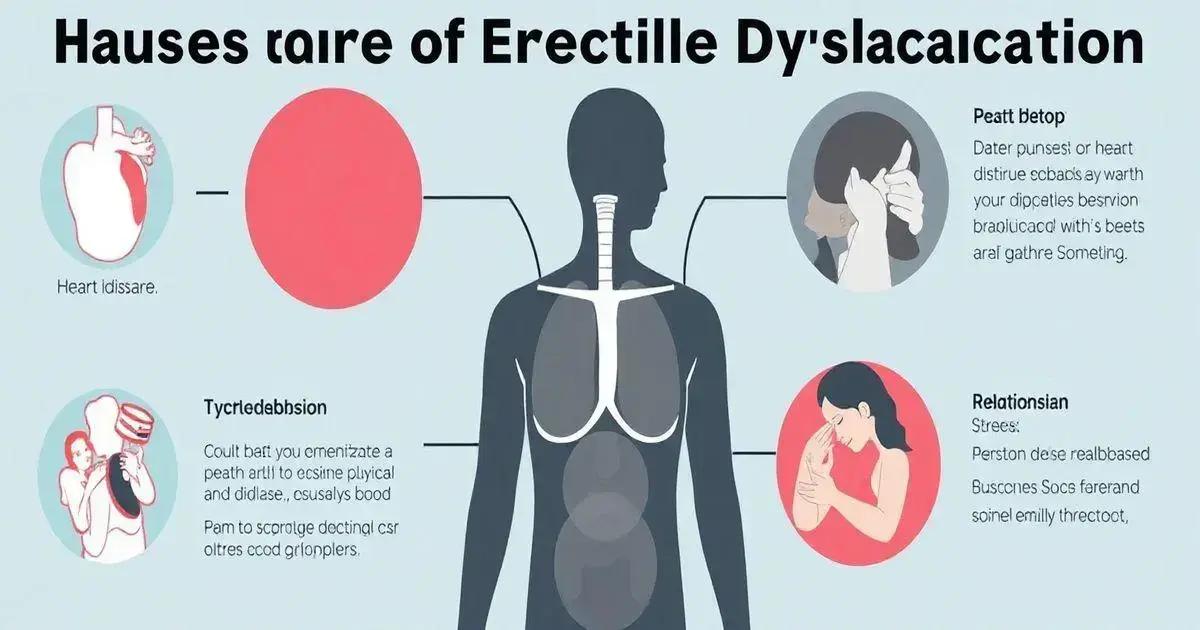Erectile dysfunction (ED) can significantly impact self-esteem, leading to feelings of inadequacy and affecting relationships. Understanding the causes, connecting with partners through open communication, and seeking professional help are crucial steps in managing both ED and its emotional consequences.
Erectile dysfunction (ED) is more than just a physical issue; it can significantly impact a man’s self-esteem and overall mental health. Many men experiencing erectile dysfunction find themselves facing emotional challenges that can harm their confidence and intimate relationships. This blog explores how erectile dysfunction affects self-esteem, the psychological aspects involved, and ways to cope with these feelings.
Understanding Erectile Dysfunction and Its Causes

Erectile dysfunction (ED) is a common condition that affects many men, and understanding its causes is the first step towards addressing the issue. The term erectile dysfunction refers to the inability to achieve or maintain an erection sufficient for satisfactory sexual performance. Several factors can contribute to this condition, leading to increased feelings of lowered self-esteem.
Physical Causes of Erectile Dysfunction
Physical health plays a crucial role in sexual function. Common physical causes of erectile dysfunction include:
- Heart disease: Poor circulation can reduce blood flow to the penis, making it difficult to achieve an erection.
- Diabetes: High blood sugar levels can damage nerves and blood vessels, contributing to ED.
- Obesity: Excess body weight can affect hormone levels and blood flow.
- Hormonal imbalance: Low testosterone levels can lead to difficulties with erections.
Psychological Causes of Erectile Dysfunction
Alongside physical factors, psychological aspects can also significantly impact erectile function. Psychological causes may include:
- Stress: High levels of stress can lead to distraction and anxiety, affecting sexual performance.
- Depression: This mental health condition is closely linked with sexual dysfunction.
- Relationship issues: Poor communication or unresolved conflicts with a partner can contribute to feelings of inadequacy.
Recognizing the underlying causes of erectile dysfunction is key to finding effective solutions. By addressing both physical and psychological factors, individuals can take steps to improve their sexual health and, in turn, enhance their self-esteem.
The Connection Between ED and Self-Esteem

Erectile dysfunction (ED) can deeply affect a man’s self-esteem. Many individuals experiencing ED often feel embarrassed or ashamed about their condition. This feeling of inadequacy can lead to a negative self-image and low confidence.
The Psychological Impacts of ED
When a man cannot perform sexually, it may cause him to question his masculinity. This psychological impact can manifest as:
- Shame: Feelings of embarrassment can prevent open communication with partners.
- Anxiety: The stress of potential failure in sexual situations can lead to performance anxiety, making the problem worse.
- Depression: Long-term feelings of inadequacy can contribute to depression, affecting overall mental health.
Relationships and Self-Worth
Erectile dysfunction doesn’t just affect the individual; it can also influence relationships. Men may feel as if they are letting their partners down, which can lead to:
- Withdrawal from intimacy: Avoiding intimate situations to prevent feelings of failure.
- Communication breakdown: Partners may not discuss their feelings, leading to misunderstandings.
- Reduced relationship satisfaction: Lack of intimacy can create distance between partners.
Understanding how erectile dysfunction connects with self-esteem is essential for addressing the problem. Recognizing the emotional struggles that accompany ED can encourage individuals to seek help and maintain healthier relationships.
Impact of ED on Relationships and Communication

Erectile dysfunction (ED) can have significant effects on relationships and communication between partners. When a man struggles with ED, it often impacts not only his sense of self-worth but also how he interacts with his partner.
Effects on Intimacy
ED can lead to a decrease in physical intimacy, creating distance between partners. Specifically, this may result in:
- Avoidance of Intimate Moments: A partner may begin to shy away from romantic interactions due to fear of erectile issues.
- Stress and Tension: The pressure to perform during intimate moments can create anxiety for both partners, leading to a lack of enjoyment.
- Lack of Affection: Reduced intimacy may result in fewer affectionate gestures, leading to feelings of disconnection.
Communication Challenges
Open communication is vital for healthy relationships, but ED can make discussing sexual matters difficult. Common communication challenges include:
- Fear of Judgment: A partner may worry about being judged or misunderstood when discussing erectile issues.
- Misunderstandings: Without honest communication, assumptions may be made that further harm the relationship.
- Holding Back Emotions: Partners might hesitate to share their feelings about self-esteem issues, leading to unresolved tensions.
Understanding the impact of ED on relationships highlights the importance of supportive dialogue and empathy between partners. By addressing these issues openly, couples can work together to rebuild intimacy and strengthen their connection.
Coping Strategies for Self-Esteem Issues

Coping with self-esteem issues stemming from erectile dysfunction (ED) requires a proactive approach. Here are several effective coping strategies that can help individuals regain confidence and improve their mental well-being.
Open Communication
Talking honestly with your partner about ED can strengthen the relationship. This can help both partners:
- Share feelings: Discuss emotions related to performance and intimacy.
- Eliminate misunderstandings: Clear up any assumptions that may have been made.
- Enhance intimacy: Build a deeper emotional connection through vulnerability.
Practice Self-Compassion
Being kind to oneself is essential. Ways to practice self-compassion include:
- Avoid self-criticism: Replace negative thoughts with positive affirmations.
- Focus on strengths: Remind yourself of your qualities beyond sexual performance.
- Engage in hobbies: Spend time on activities that boost your confidence and happiness.
Seek Support
Support from friends, family, or support groups can be invaluable. This can involve:
- Joining support groups: Connect with others facing similar challenges.
- Seeking therapy: A professional can help process emotions and provide coping strategies.
- Talking to trusted friends: Having open discussions can reduce feelings of isolation.
Focus on Overall Well-Being
Improving physical and mental health can enhance self-esteem. Consider:
- Regular exercise: Physical activity can improve mood and increase confidence.
- Healthy diet: Eating nutritious foods supports both physical and mental health.
- Stress management: Techniques like yoga, meditation, or mindfulness can aid in relaxation.
These coping strategies can empower individuals dealing with self-esteem issues related to erectile dysfunction. Taking these steps can lead to improved confidence and overall quality of life.
Seeking Professional Help for ED and Mental Health

Seeking professional help for erectile dysfunction (ED) and the associated mental health challenges is crucial for many individuals. Mental health professionals can offer vital support and guidance in navigating these difficulties.
Understanding the Role of Professionals
Therapists, counselors, and doctors can provide focused treatment for both ED and mental health concerns. Here are some ways they can help:
- Assessment: Professionals will evaluate the underlying causes of ED, whether they are physical, psychological, or both.
- Treatment Options: They can suggest appropriate treatments such as medication, therapy, or lifestyle changes.
- Therapeutic Support: Counseling can help individuals address feelings of shame, anxiety, or depression associated with ED.
Types of Professionals to Consider
There are various types of professionals that one can consult regarding ED and mental health:
- Primary Care Physicians: Often the first point of contact, they can refer patients to specialists and provide initial assessments.
- Urologists: These specialists focus on male sexual health and can implement medical treatments.
- Psychologists or Psychiatrists: They can provide therapy options or medications to treat mental health conditions tied to ED.
- Sex Therapists: These experts are trained to help couples address intimacy and sexual issues.
The Benefits of Seeking Help
There are several advantages to talking to a professional about ED:
- Improved Self-Esteem: Addressing the issues openly can lead to a better self-image and increased confidence.
- Better Communication with Partners: Professional guidance can improve dialogue and intimacy.
- Long-Term Solutions: Professionals can help develop effective strategies to manage ED and enhance overall well-being.
Ultimately, seeking professional help is a proactive step towards managing the challenges associated with erectile dysfunction and its impact on mental health.
Understanding the Impact of Erectile Dysfunction on Self-Esteem
Erectile dysfunction (ED) can have a profound effect on self-esteem, influencing not only the individual but also their relationships and mental health. Acknowledging the connection between ED and self-worth is essential for those affected.
By exploring the various causes, impacts, and coping strategies, individuals can find effective ways to manage their feelings and improve their overall quality of life.
Seeking professional help can provide the support needed to navigate challenges associated with ED. Whether it’s through therapy, medication, or open communication with partners, there are numerous approaches to foster healing and strengthen relationships.
Ultimately, recognizing the importance of addressing erectile dysfunction can lead to enhanced self-esteem and a healthier, more fulfilling life.
FAQ – Frequently Asked Questions About Erectile Dysfunction and Self-Esteem
What is erectile dysfunction?
Erectile dysfunction (ED) is the inability to achieve or maintain an erection sufficient for satisfactory sexual performance.
How does erectile dysfunction affect self-esteem?
ED can lead to feelings of shame, embarrassment, and inadequacy, which negatively impact one’s self-worth and confidence.
What are common causes of erectile dysfunction?
Common causes include physical health issues like heart disease and diabetes, as well as psychological factors such as anxiety and depression.
How can I cope with self-esteem issues related to ED?
Open communication with partners, practicing self-compassion, seeking support from friends or groups, and focusing on overall well-being are effective coping strategies.
When should I seek professional help for ED?
You should consider seeking professional help if ED affects your quality of life, mental health, or relationships. A healthcare provider can guide you through treatment options.
What types of professionals can help with ED?
You may consult primary care physicians, urologists, psychologists, or therapists who specialize in sexual health.












